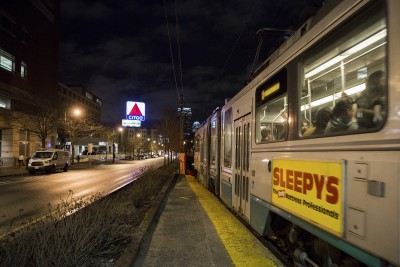
The Massachusetts Bay Transportation Authority removed Late-Night Service hours from employees’ schedules for the month of March, according to MBTA spokesperson Jason Johnson.
“MBTA bus and train operators have begun picking their work for the spring timetable, and the schedules from which they choose their work do not include late night service routes,” Johnson wrote in an email.
Johnson said the removal of the service from schedules is only a precaution and not symbolic of a decision to end Late-Night Service.
“The schedules were posted without the late night routes because it is less difficult to add service than it is to remove it,” Johnson wrote in an email. “If the operators pick work today that doesn’t exist in the spring, they are still entitled to be paid for it. If a decision is made to maintain the service in the spring, the MBTA will see to it that the service is indeed provided.”
The MBTA’s Fiscal and Management Control Board will meet to consider the Late-Night Service Feb. 29, according to Johnson.
Peter Furth, a professor at Northeastern University, explained why the MBTA would remove the service from schedules before making a final decision about the future of the service.
“Once schedules are made, you have to pay people for their schedules and if you say, ‘OK, we’re not running that service,’ you still have to pay those people,” Furth said. “Every operator is guaranteed eight hours of work.”
Furth also discussed the economic need to cut Late-Night Service.
“When the fare that a person pays is always going to be the same, [riders are] paying $2 for a subway ride, but the average cost of providing that subway ride becomes $10 or $15,” Furth said. “It’s just not worth it, because the person is only paying $2. Now who’s paying the other $8? It’s all of us collectively, by subsidizing.”
Barbara Jacobson, programs director for the Massachusetts Bicycle Coalition, said the MBTA should focus on its riders and providing them with the services they need.
“By limiting service while increasing the price per ride, it sends a negative message to the user base, and in order for sustainable transportation, public transportation to be taken seriously,” Jacobson said. “Issues of accessibility and maintenance need to be the forefront of the discussion. So ensuring that the MBTA continues to deliver service to people who need it the most should be at the forefront of the discussion.”
Jacobson emphasized the importance of the service for restaurant employees and patrons.
“If the Late-Night T Service is cut, it would have a negative impact for a variety of users throughout the City of Boston, notably people who work in the restaurant industry who need to use the subway to get to and from their jobs, as restaurants close later than other businesses throughout the city,” Jacobson said. “It will also negatively impact patrons to businesses throughout the city as well.”
Several Boston residents shared their opinions on the decision.
Kelly Daigle, 27, of East Boston, said Late-Night Service benefits restaurant customers but not the workers themselves.
“For restaurant workers, it doesn’t run all week, which is when I would need it,” she said. “And usually if you’re working in a restaurant as a bartender, you might even be getting out later than the late-night T runs. [The T] is for the people who are going to restaurants and staying until it closes, not necessarily for the people who work there.”
Daigle also discussed why it might appear that the service isn’t commonly used.
“It just wasn’t around long enough for people to develop habits around using a late-night T,” she said. “If they were better at advertising what the hours were and giving people a more predictable schedule, we might be using it more readily.”
Helen Anis, 67, of Allston, noted that cutting Late-Night Service would also affect those arriving at the airport.
“If they shut it down, it would impact airport workers who have to come in in the middle of the night, students who go out partying and the rest of us who just like to go out to shows and things,” she said. “People who are delayed at the airport and come in at like 1 in the morning will have to take a cab.”
Leo Gomes, 33, of Kenmore, said even though he has never used Late-Night Service, it is still important.
“When I go out, I usually take an Uber or something like that,” he said. “But I don’t think it’s a good idea for them to shut it down. I think it’s much better for the whole population for the T to work longer hours.”
























































































































